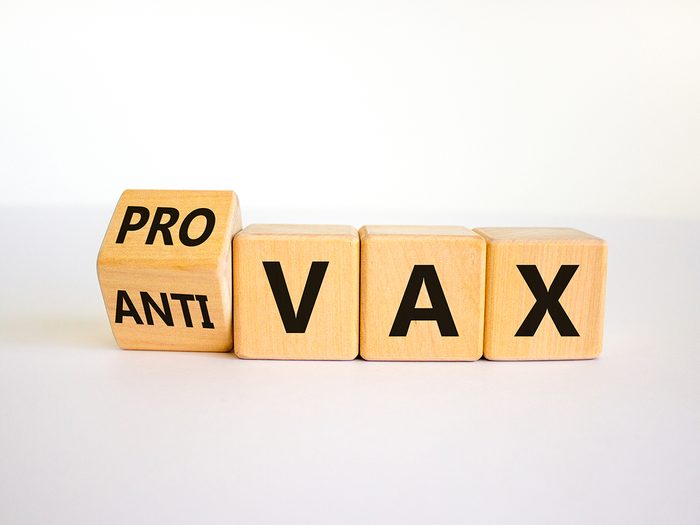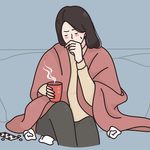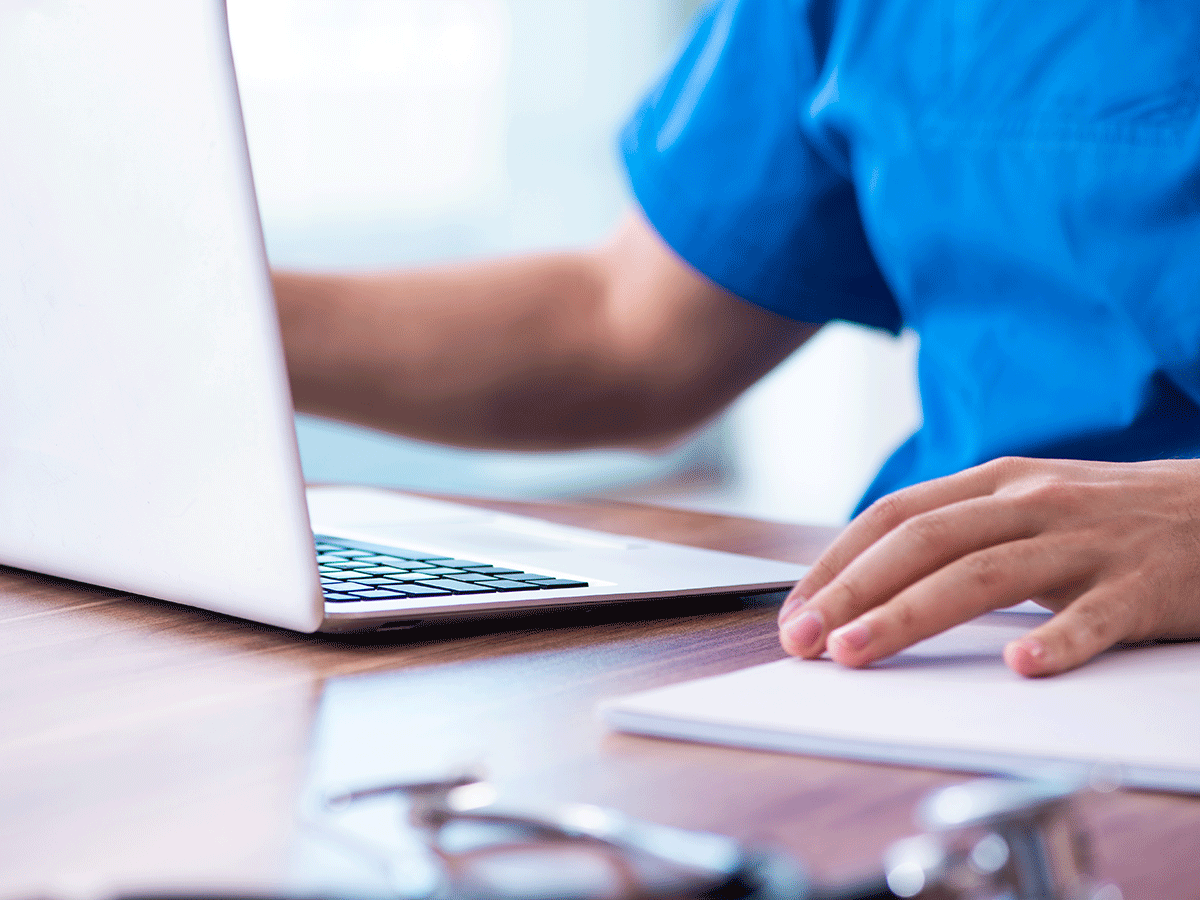I Was Vaccine Hesitant. This Is What Changed My Mind.

An Alberta mom shares how she went from vaccine hesitant to getting the COVID-19 vaccine and proudly posing in front of “I got my COVID shot” posters.
Growing up, I got all the standard childhood vaccines and when I went travelling in my early 20s, I got a vaccine for yellow fever and took malaria pills. I didn’t really think anything of it.
I live in Red Deer, Alberta, a conservative area both politically and religiously. I got married when I was 25 and became pregnant at 27. That’s when I started to mistrust the mainstream medical industry.
I considered myself an amateur researcher and I started reading about the high rates of caesarean sections in the hospitals in our area and got worried. I wanted to have this perfect, natural birth. I also started distrusting the medical industry when I saw the difference of care I was receiving from a midwife versus a doctor. My midwife really listened to me, while the doctors would only give me 15 minutes. I had a home birth with midwives, no medication, and everything went smoothly. That positive experience fuelled my confidence like, “See, I did the right thing.”
I started reading about all the positives of breastfeeding and how it makes your babies immune to certain things, and how good food and a healthy lifestyle could make kids less susceptible to certain illnesses, so I decided not to vaccinate my baby. When I met people who didn’t agree with me, they would say things like “You’re stupid. How could you think that? You’re endangering your child. It’s child abuse.” But really, I couldn’t bear anything happening to my child, and based on what was I reading in Facebook groups and natural parenting books, I thought any vaccine or medication would have a much greater negative impact.
(Related: How to Talk to Your Loved Ones About the COVID-19 Vaccines)
I ended up forming bonds with other moms who also experienced the same kind of pushback. I connected with a lot of these moms in Facebook groups, and eventually ended up starting a “natural moms” Facebook group. Looking back, we were so discriminatory. If someone showed up with a package of processed cookies or crackers for their baby, we’d be like “Oh my God. I can’t connect with this mom.” You were either in 100 percent, or out.
Around this time, I also started home schooling my kids—I have three kids, now aged 9, 7 and 3. There’s a lot of crossover in the ideologies of home birth, natural food and homeschooling.
Early into the pandemic, my husband and I watched this “documentary” on YouTube called Plandemic. The 26-minute video, which has since been widely discredited and removed for spreading COVID-19 misinformation, suggested that the pandemic was planned by the big CEOs of the world like Bill Gates. We were like, “This is crazy, but can you imagine if this was true?”
COVID had only been here for two weeks in North America, and some people were already talking about a vaccine. How did they know it was coming? Was it just a way for medical companies to make a lot of money? We had a lot of questions, but one thing was certain: we were not getting the vaccine.
(Editor’s note: At the time of publication, 83 percent of Canadians 12 and older are fully vaccinated.)
My turning point
My thinking started to shift in June 2020. We had been shutdown for two and a half months. I thought, there’s no way this is a hoax because it’s not economical for anyone other than Jeff Bezos. My family was also being hit so hard financially. My husband was a bartender, I was a stay-at-home mom and our savings were dwindling. I wanted to be more solution focused, like, how do we get out of this?
I decided to be curious and open-minded to a vaccine. People always say to see “both sides”, and I actually decided to do it. I started following scientists on Instagram, like infectious disease specialist Laurel Bristow and science communicators Samantha Yammine (@science.sam) and Sabina Vohra-Miller (@UnambiguousScience). They made science accessible and easy to understand. Instead of sounding condescending or saying, “This is what you should do,” they said, “Here’s a bunch of information. Here’s what we know so far.” They talked about real stats and real studies. I started to realize that my idea of “research” wasn’t actually research. I was just reading blogs and opinion pieces based on personal experiences. I learned how to think more critically.
View this post on Instagram
Even before the pandemic, I started disconnecting from some of the groups I helped found because I just couldn’t keep up with the perfectionism it required. Then during the pandemic, I started unfollowing or muting more people on social media because they were sharing misinformation. Reading that content could make me start second-guessing myself. It wasn’t worth it. By the end of 2020, when doctors and health care workers were first starting to get the vaccine, I didn’t cringe the way I usually would have. By early 2021, when my grandparents got their COVID-19 vaccines, I was ready to get mine, too.
I got my first dose in May 2021. I felt so ready by that time. Me, my friends and family were sending selfies with the “I got my COVID shot” posters. We were all celebrating. It felt like we could finally be together again.
(Related: The Quick and Easy Way to Save COVID Vaccine Passports on an iPhone)
Advice for communicating with vaccine hesitant people
Based on my experience, and what I’ve seen in the online groups, a lot of people who are vaccine hesitant fear that vaccinations will cause some kind of debilitating chronic issue. The thought is: “I’ve had the flu. It sucks, but it’s not as bad as being chronically ill your whole life.”
For a lot of people, once they’ve made up their mind, they stop looking for answers. And so just even presenting some facts in a patient, kind way can make a big difference. I remember when people told me, “You’re stupid, you’re endangering your child,” it made me think, “You don’t know anything about me then because I live for my children. And if you don’t know anything about me, I don’t need to listen to your opinions.”
If you’re trying to communicate with hesitant people, I encourage curiosity instead of anger. Ask them why they’re feeling hesitant and maybe you’ll be able to get to the root of one of things they’re worried about and help them find sources that isn’t just news being shared on social media.
If you’re feeling vaccine hesitant, reflect inwards on why you’re feeling this way and be open and willing to just look. There’s no commitment. Read from sources beyond shared posts, go beyond the general headlines and follow some real scientists and experts online.
Earlier this month, I took my daughter to the emergency room for croup. She woke up in the middle of the night and she couldn’t breathe because her throat was closing up. It was the most scared I’ve ever been. On the way to the hospital, I decided that as soon as she’s better, I’m booking all the kids in for their vaccines. There’s no vaccine for croup, but I couldn’t bear the thought of something like this happening to her because of a simple thing I didn’t want to do. I don’t want her to ever suffer from something that is preventable with a vaccine.
Once the COVID vaccine is approved for ages five to 11, I’m planning to get my kids vaccinated. I want my kids to get their lives back, to be able to do activities again, see their friends and have parties. For parents who are hesitant, I understand, because when do we ever make any choice about our child where we don’t worry if we’re doing the right thing? For me, I found some sources I trusted and made me feel like I can make a better choice for my kids.
Next: A Province-by-Province Guide to Vaccine Passports in Canada




